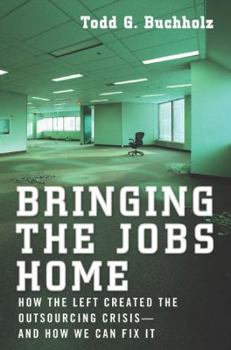Bringing the Jobs Home: How the Left Created the Outsourcing Crisis--And How We Canfix It
Outsourcing is no longer just a problem for factory workers. Suddenly, software writers and radiologists are easier to hire and work with in India than in Indiana. But who can fault companies for... This description may be from another edition of this product.
Format:Hardcover
Language:English
ISBN:159523005X
ISBN13:9781595230058
Release Date:September 2004
Publisher:Sentinel
Length:192 Pages
Weight:0.77 lbs.
Dimensions:0.8" x 5.8" x 8.3"
Customer Reviews
5 ratings
Brilliant and Humorous
Published by Thriftbooks.com User , 18 years ago
I loved this book; it was funny, informative, and very well written. For those who want a quick, new, and great approach on today's economical situations.
Contrary to Close Minded Liberal's beliefs, It is great!
Published by Thriftbooks.com User , 18 years ago
This is an absolutely excellent book. Even if you are a democrat, unless you are completely close minded and ignorant, you will enjoy it. Not too politically biased, the book gives the current economic challenges of outsourcing a comical spin, and puts things in perspective. I loved it, and recommend it for anyone; regardless of whether you care a great deal about the economy, it is a funny and enlightening quick-read.
Thought (and, I hope, discussion) provoking arguments
Published by Thriftbooks.com User , 20 years ago
Todd Buchholz argues that the reason jobs are going overseas has a lot more to do with systemic aspects of the American educational, regulatory, legal, and tax systems than with evil CEOs. I think he is right that CEOs are simply responding to competitive pressures and the business environment in which they have to compete. Right now, that means moving certain classes of jobs to other markets. I don't mean to say that there aren't incompetent CEOs or businesspeople that are simply bad people. What I am saying is that for the most part the people running businesses do not have the power to do as they wish. They have to respond to the business environment in which they find themselves. Just like a frog, turtle, bird, or trilobite they adapt or die. Job dislocations always cause anxiety. When the railroads came they created a great many jobs, but when railroads gave way to cars, trucks, and airplanes, most of those jobs ceased to exist. There was a great deal of pressure on legislators to protect those jobs, and to the extent they did, they actually hurt the American economy. I don't mind help in transitioning workers, I just think it is counterproductive to try and hold on to the past. We used to have a tremendous industry in breeding and selling horses. Where is that today? This kind of dislocation is inevitable and actually healthy. What is not healthy is not preparing folks with a competitive education. As Mr. Buchholz points out, feeling good about yourself when you are uncompetitive in mathematics is not helpful. Nor is having a legal and tax system that raises costs of workers and raises prices to consumers simply to make lawyers rich and provide jobs to bureaucrats who could be more productively employed in the private sector. Governments run a fine line in creating laws in favor of this or that business. They always run the risk of unintended consequences. Neutrality is almost always the best policy, but that isn't what their constituents clamor for. Nowadays there is an environment that makes workers more expensive than they need to be (not just wages and benefits) and then provides tax incentives for companies to take their production overseas. How are these behaviors smart or healthy for the economy? The author also argues that American businesspeople are too often tone deaf to the needs and demands of foreign markets. In the past, overseas markets wanted the same products we made for our home consumption, or wanted them with some modification. Nowadays, overseas markets have demands specific to them and local means of meeting those demands. If we are to compete, we must take those markets seriously and learn what they want and produce it for them. Mr. Buchholz uses Hollywood as an example of this, but in business school we studied cases with other examples of this very issue. I recommend this book for everyone. It is less than 180 pages and is written very clearly. The arguments are focused and will encoura
Even Democrats Have to Read this Book!
Published by Thriftbooks.com User , 20 years ago
Buchholz's book is much more than a pre-election rebuttal of the nonsense both sides spout on outsourcing. It is a must-read analysis of the educational, technological, and deomographic bases of American prosperity and international competitativeness and a blunt attack on the mis-guided policies that threaten these strenghts and threfore our standard of living. Though Buchholz tries to blame every dumb policy on the "liberals," Democrats will have an especially good time picking out the policy blunders (farm policy!) that Buchholz's Republican buddies have stuck us with. And it's fun to read.
Solid & enjoyable
Published by Thriftbooks.com User , 20 years ago
As with Todd Buchholz's earlier books, Bringing the Jobs Home is both entertaining and educational. Buchholz puts economics in a language the layman can understand. This book is a sorely needed (and effective) counter-weight to the alarmists who are increasingly framing the trade debate.





